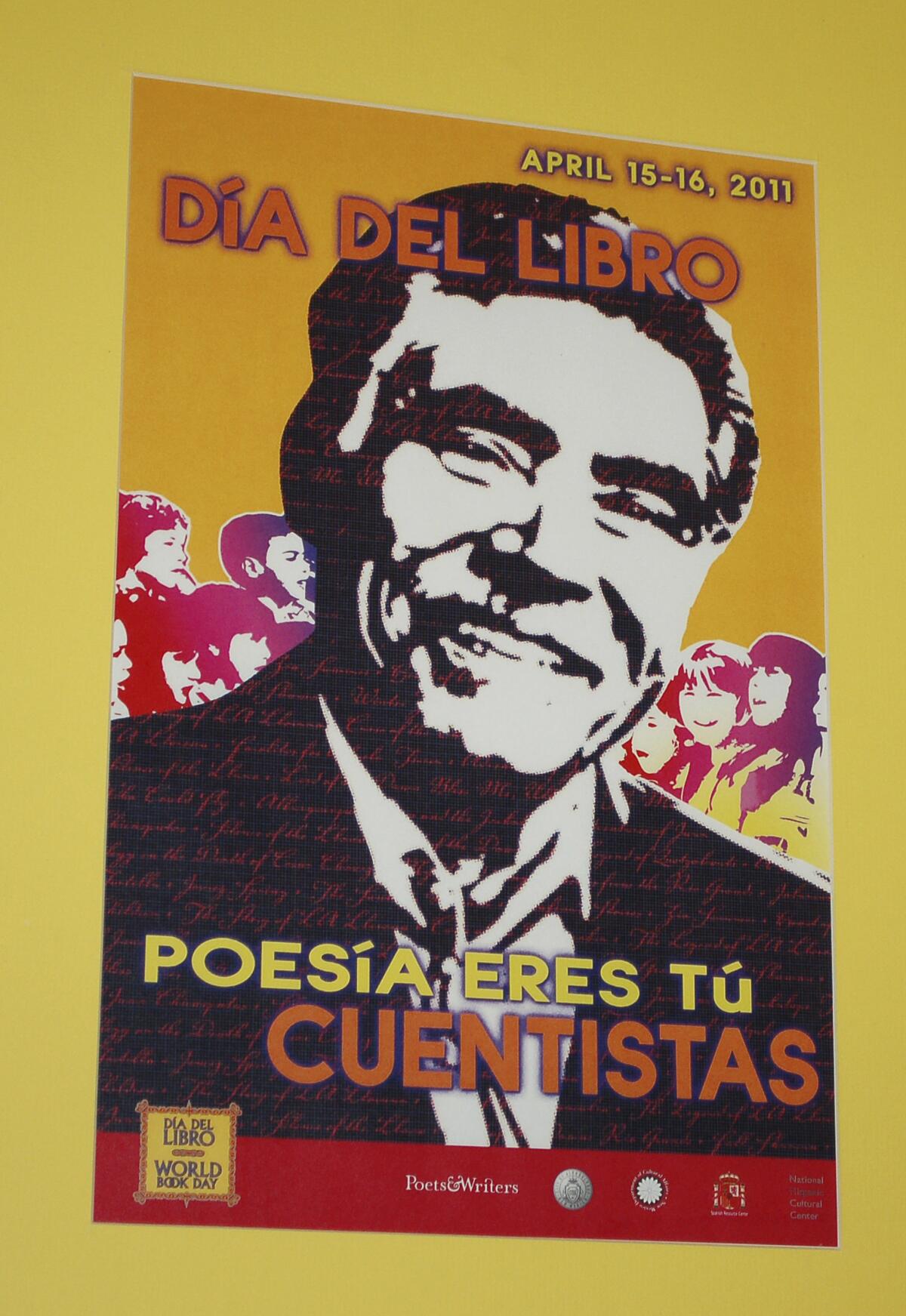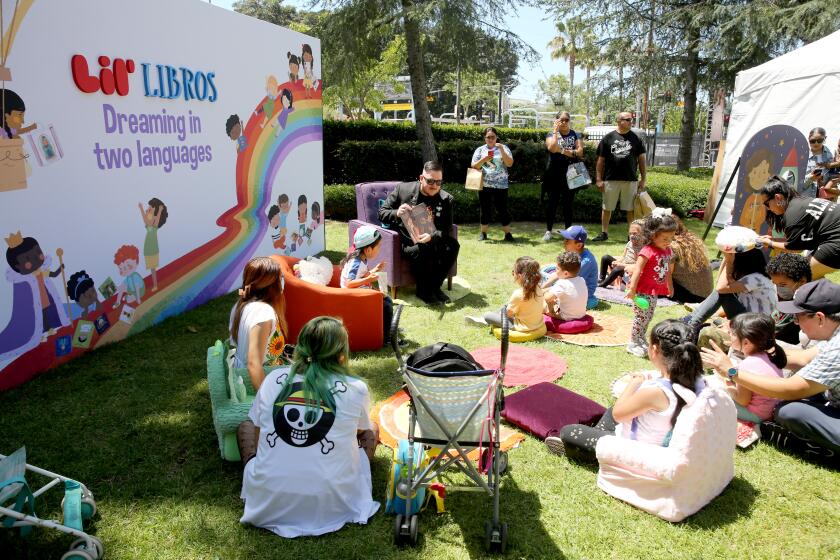Op-Ed: The stories I needed as a Chicano boy were silenced. Now I tell them

- Share via
“What do you know, you stupid Mexican?”
I stood mute in Los Angeles’ searing afternoon sun, my high school football uniform soaked with perspiration from practice. I blinked and simply stared at one of the coaches who had grunted that question. Most of the men sitting around him, and a few of my teammates, snickered.
It was 1973, my freshman year. At the time, almost the entire football coaching staff was white. It would be a few years before a person of color was hired into their ranks.
Perhaps the most impactful thing a parent of color can do is encourage their kids to read books. It will help them know themselves and others better.
What prompted that coach to offer his bigoted retort? The coaches had been sitting in their office, which had windows that opened into the area where students lounged around during breaks in practice because it was shady, and the water fountain was nearby. Often, the coaches would address us through the office windows. This afternoon, they were arguing about who wrote the song “Blue Suede Shoes.” The coach in question asserted that it was Elvis Presley.
Being true to my Chicano culture, I knew my oldies.
“Carl Perkins wrote and recorded it first, but Elvis had a big hit with it later.”
The coaches turned to me as one. The coach I had corrected sneered and offered his response: “What do you know, you stupid Mexican?”
This Mexican kid — I would never be acknowledged as a Chicano by those men — dared to correct a white man. And that white man had the power to put a Mexican kid in his place.
I have many similar stories from years of living in Los Angeles that I won’t recount here. But that’s the problem. The stories I needed — as a Chicano boy — weren’t offered to us as students in this city. Our curricula never included books by anyone but white men, though a few titles by white women appeared from time to time. And it was no different from the English-language television shows and movies from that era. If we did appear, we were mostly background characters at best — or ugly stereotypes with little or no agency within the story.
But at home or family gatherings, my parents and older relatives often told us wonderful, funny and sometimes heartbreaking stories of their experiences as children of Mexican immigrants or immigrants themselves. Why weren’t these stories taught in class or depicted on television or in movies?
This is one of the main reasons I became a writer. I tell stories where the stars of my narratives are of Mexican descent and resemble people like me, my family and the immigrant neighborhood of my childhood. And when I say stars, I don’t mean saints. My characters include the good, bad and ugly.
As a reader, I was equally hungry to discover other voices from my community. But in my search, I realized how difficult it was to access our work because it had not been gathered in one place. So, almost two decades ago, I put out a call for submissions to address the shocking fact that there had never been an anthology of Los Angeles fiction by Latinx writers. The response felt overwhelming, with the majority of manuscripts coming from Chicanx writers. When the anthology was published in 2008, readers often asked: “Why wasn’t this done before?”
Certainly, lack of quality was not the reason. My anthology included powerful, eloquent and vital works of literature by both new and veteran writers. I concluded that structural racism in both publishing and our educational system could be the only culprit in keeping our writing out of the American canon.
I gathered authors whose work should be on any reading list of Los Angeles fiction. For example, the oldest story I included was “Kid Zopilote,” written by Mario Suárez in 1947. There are also stories from female writers, including “Tears on My Pillow” by Helena María Viramontes and “Adriana” by Reyna Grande. Novels that should be part of high school and college curricula, which I excerpted, are Richard Vásquez’s 1970 book, “Chicano,” Alejandro Morales’ “Barrio on the Edge” from 1993, and Salvador Plascencia’s “The People of Paper,” published in 2005.
Denigrating multilingualism is rooted in the desire to restrict who can belong here. Saying our true names is one way to fight that idea.
I can’t imagine how different my self-identity would have been if my teachers had known about and assigned an anthology similar to the one I had edited. Not only would I have been exposed to literature that connected with me on a personal level, but it would have validated my culture and perhaps diminished — if not fully eradicated — the impostor syndrome that lurked in my darker thoughts. For students from other backgrounds, these works could have exposed them more deeply to a culture different from their own and maybe nurtured their capacity to empathize with “the other.”
School curricula and publishers have made much progress since 1973. Indeed, 30 years later, my son’s high school reading lists included titles by such literary luminaries as Rudolfo Anaya, the doyen of Chicano literature, and Sandra Cisneros — two writers who deeply inspired and influenced me as a writer. But too many historically marginalized writers still battle ingrained bias to obtain acceptance by agents and publishers that authors from more entitled backgrounds take for granted. And even if published, we see a resurgence of book banning and attacks on literature that dare address such things as homegrown bigotry and racism.
Over a decade ago, I read that my football coach had passed away suddenly. He was lauded in the high school’s newsletter and in his obituary. He clearly had good traits and touched many people. But my memory of him is forever sullied by that one hot Los Angeles afternoon.
And what happened to me? Well, this “stupid Mexican” became a writer who is driven to tell stories that show there is nothing stupid about me and my community.
Daniel A. Olivas is the author of 10 books, including “How to Date a Flying Mexican: New and Collected Stories.” @olivasdan
More to Read
A cure for the common opinion
Get thought-provoking perspectives with our weekly newsletter.
You may occasionally receive promotional content from the Los Angeles Times.











